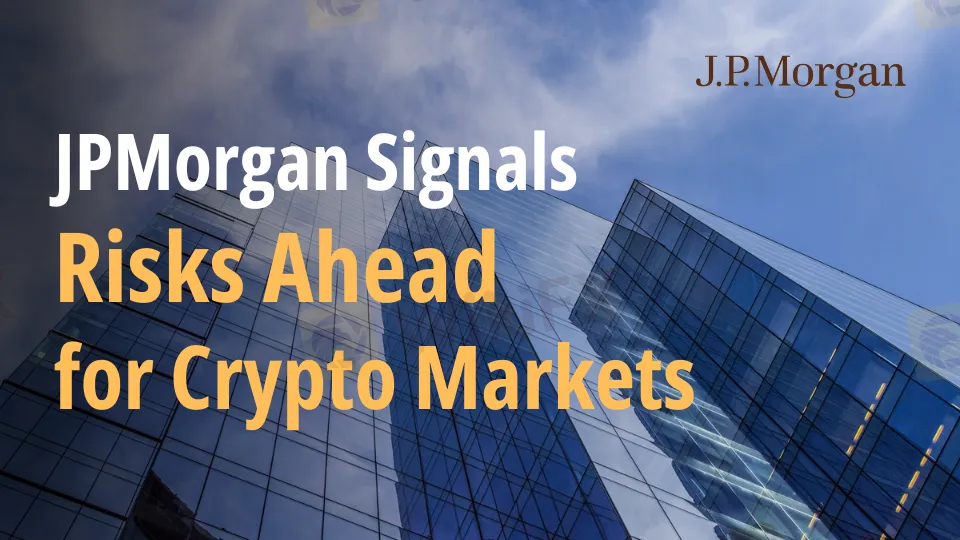简体中文
繁體中文
English
Pусский
日本語
ภาษาไทย
Tiếng Việt
Bahasa Indonesia
Español
हिन्दी
Filippiiniläinen
Français
Deutsch
Português
Türkçe
한국어
العربية
JPMorgan Signals Risks Ahead for Crypto Markets
Abstract:JPMorgan highlights risks in crypto markets due to low VC investment and the SEC's hesitancy on Ethereum ETFs.

JPMorgan Chase, a prominent multinational financial institution, has made a serious cautionary statement on the safety of the Bitcoin marketplace. The research identified a significant deceleration in the level of venture capital allocated to the cryptocurrency sector, a factor considered vital for maintaining the long-term stability of cryptocurrency values.
Analysts at JPMorgan, among them the well-known managing director and global market strategist Nikolaos Panigirtzoglou, have noted that the slow venture capital moves thus far this year stand in sharp contrast to the levels seen in prior years. “We had previously argued that a recovery in crypto VC flows is a necessary condition for a sustained recovery in crypto markets, so in our minds, the subdued VC flows YTD pose a downside risk,” said Panigirtzoglou.
The excitement in venture capital has subsided, but the environment for cryptocurrency hedge funds is quite different. These funds have shown rapid growth, with their assets under management rising to an estimated $20 billion in the last half-year, indicating a change in the direction of the financial power consolidation in the cryptocurrency space.

The research upheld JPMorgan's cautious view on near-term prospective gains in well-known cryptocurrency products like exchange-traded funds (ETFs), despite the growing influence of hedge funds. The experts expressed a diminished probability of the approval of a spot Ethereum ETF within the next month. The continuing investigation launched by the Securities and Exchange Commission (SEC) on the Ethereum Foundation has heightened the experts' distrust. This inquiry has resulted in a decrease in market confidence, as seen by the growing decrease in the net asset value (NAV) of the Grayscale Ethereum Trust.
In contrast, JPMorgan's projection shows a rather optimistic outlook. Gary Gensler, the chairman of the Securities and Exchange Commission (SEC), has not responded to a recent request for clarity from forty-eight senators in the United States about the classification of Ethereum as either a commodity or a security.
The analysts maintain their longer-term optimism, arguing that the same legal road might eventually lead to SEC approval for Ethereum products, just as litigation helped to make Bitcoin ETFs possible. This optimism seems to harbor a sliver of hope that cryptocurrency investment and regulatory environments may eventually converge more favorably.
JPMorgan's study is a sobering reminder of the difficulties that lie ahead as the cryptocurrency market continues to thread its way through a complicated web of financial, legal, and market forces. The market has the potential to provide significant profits, but it is becoming more and more obvious that managing it will require a sophisticated grasp of both its volatile character and the complex regulatory framework that controls it.

Disclaimer:
The views in this article only represent the author's personal views, and do not constitute investment advice on this platform. This platform does not guarantee the accuracy, completeness and timeliness of the information in the article, and will not be liable for any loss caused by the use of or reliance on the information in the article.
Read more

Georgia Man Charged in Danbury Kidnapping and Crypto Extortion Plot
Georgia man James Schwab charged in Danbury kidnapping tied to $230M crypto heist. Plot targeted couple for ransom after Miami altercation with son.

Bybit Shuts Down NFT Marketplace Amid Crypto Market Downturn
Bybit announces the closure of its NFT marketplace, citing efforts to streamline offerings. Discover the latest trends in the declining NFT market and its shift to utility-based growth.

Galaxy Digital Settles $200M in Luna Token Manipulation Case
Galaxy Digital pays $200M to settle Luna token manipulation probe by NY regulators, linked to TerraUSD’s 2022 crash, impacting crypto market stability.

April Forex Trends: EUR/USD, GBP/USD, USD/JPY, AUD/USD, USD/CAD Insights
Know April’s forex seasonality trends for EUR/USD, GBP/USD, USD/JPY, AUD/USD, and USD/CAD. Historical insights and key levels to watch in 2025.
WikiFX Broker
Latest News
Exposing the Top 5 Scam Brokers of March 2025: A Closer Look by WikiFX
Gold Prices Climb Again – Have Investors Seized the Opportunity?
Webull Launches SMSF Investment Platform with Zero Fees
Australian Regulator Warns of Money Laundering and Fraud Risks in Crypto ATMs
The Withdrawal Trap: How Scam Brokers Lure Victims into Paying More
FCA to Investors: Think Twice Before Trusting These Brokers
Trump\s tariffs: How could they affect the UK and your money
Trump gambles it all on global tariffs he\s wanted for decades
HTFX Spreads Joy During Eid Charity Event in Jakarta
How Will the Market React at a Crucial Turning Point?
Currency Calculator







